Top 5 Archaeological Discoveries in Greece in 2024
From a mysterious Minoan structure to...
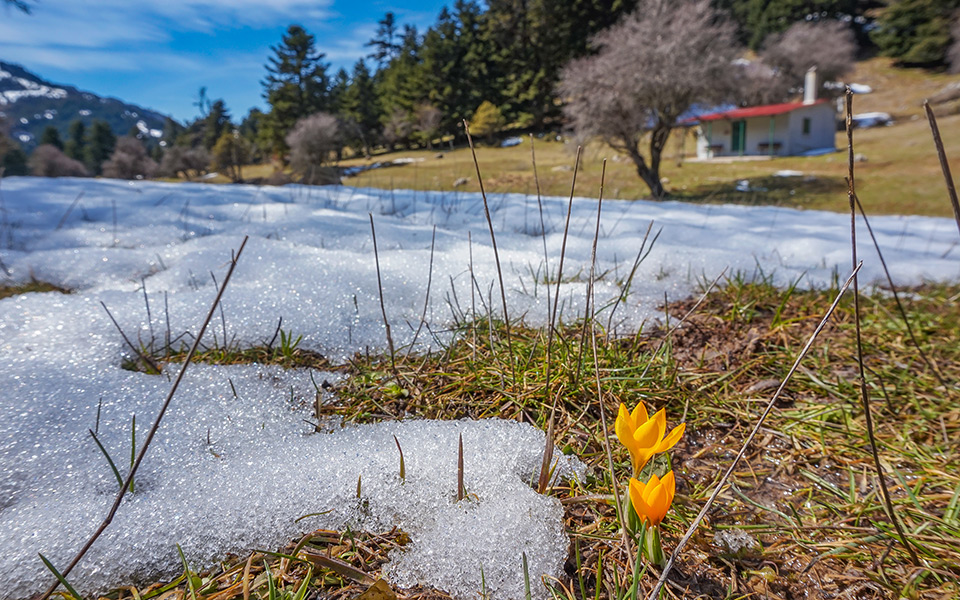
© Shutterstock

Empty slopes at Kalavrita ski resort
© Shutterstock
January is here, the holidays are over, the last remaining crumbs of kourabiedes and melomakarona have been savored and its time to hunker down for the long darkness of winter. Right? Well not quite – in Greece the holiday season actually wonderfully extends a bit longer to include the feast of the Epiphany on January 6th, when around the country young men dive into to the frigid sea as part of a ceremony to bless the waters.
Beyond that much of life returns to regular scheduling, but that doesn’t mean one has to succumb to the post-holiday blues. Cities like Athens and Thessaloniki are, as always, brimming with life and things to do (and drink and eat) day and night.
A major added bonus is that in January the winter sales season begins (which lasts through February) with shops throughout the country offering major discounts, so now is the time to buy all those presents for yourself that your friends and family somehow forgot to give you.
With most Greek families getting back to their routines this is also a great month to head to the country’s ski resorts for some snowy fun. Greece’s resorts like Parnassos and Kalavryta may not be anywhere near the size of bigger resorts in northern Europe but they can offer some super fun days on the slopes for all abilities – provided you avoid the busiest days when the crowds and long lift lines can get frustrating (i.e. sunny weekends and holidays). But if you can get away midweek in January you will have the slopes (and with luck some fresh powder and sunshine) almost entirely to yourself.
Alternatively head to any one of Greece’s many fantastic winter destinations or superb spas to detox and decompress after the holidays and start the year off right. Just be sure to always have snow chains in the car if driving and to check the local weather forecasts to avoid any unpleasant surprises.
Best For: Bargain hunting in the cities; skiing and snowy adventures in the mountains
Worst For: Suntanning

Carnival revelers in Xanthi
© Shutterstock
Let’s face it, dubious arrow-slinging cherubs aside, there are few who are thrilled with the prospect of February. It’s cold and dark, the good cheer of the holidays has dulled and faded, like a glass of mulled wine left outside overnight, while summer still feels impossibly far off. What could there possibly be to raise one’s spirits?
Why the primal excesses of Carnival of course!
In 2023 Greek Orthodox Easter comes in the middle of April (see April) which means that Apokries – Greece’s version of Carnival that lasts for the three weeks leading up to the beginning of Lent – falls pretty squarely in February in 2023 (specifically it begins on February 5). During Apokries, all across Greece various celebrations are held culminating on the last Sunday (February 26 this year) when large, colorful parades are held. The most famous of these is of course that held in Patras, while cities like Rethymno in Crete and Xanthi in the north of Greece also go all in with major events in which everyone participates in building or cheering on the creative and often cheekily satirical floats.
Beyond the parades, throughout Apokries different regions (particularly in the north) observe a wide variety of local customs, many of which have deep roots in ancient Dionysian fertility-promoting rituals. Each comes with its own complex blend of local history and folklore, but common themes are invariably elaborate costumes, raging bonfires and plenty of wine, food and dancing. It’s a great time to discover another, more primeval side of Greece.
Another inextricable part of the Apokries season is Tsiknopempti – the Thursday when, in preparation for transitioning to a vegetarian diet for Lent, communities feast on grilled meat, the scent of which fills the air (the name Tsiknopempti deriving from the word tsikna – meaning smoke from cooking meat). Perhaps unsurprisingly, even as fewer and fewer people diligently observe the Lent fast, consuming large amounts of meat on Tsiknopempti remains as popular as ever. As such bars, restaurants and more host bbq events, making it the perfect day to indulge your inner carnivore.
Towards the end of February the bacchanals of Apokries are replaced with the detox of Lent, beginning with Clean Monday (27/02 in 2023) when it is traditional to fly kites and enjoy veggie and seafood-rich lunches.
Best For: Dressing up and letting loose
Worst For: Skinny dipping

© Shutterstock
Maybe, maybe not. While the days may be finally growing perceptibly longer (although not by much) March is a notoriously fickle month in Greece. It is liable to lull you into leaving your warm jacket at home with balmy morning temperatures only to stab you in the back with rain and icy gusts in the evening, making a mockery of your thin cotton trousers and trusting, optimistic nature.
So this month is actually best spent not by frustratedly wishing the winter away, but by cherishing the month’s variety, bidding the cold season a fond, lingering farewell even as you start to believe that warmer days are coming soon.
The mountains remain heavily snowcapped, yet at sea-level the temperatures can hit the high teens and even the 20s meaning that with a bit of luck and planning you can enjoy the winter-spring transition as if it was happening in just one day.
Indeed some of the most unique skiing Greece has to offer can actually be had this month. A healthy snowpack can combine with cloudless skies to create those magical days where you can ski in a t-shirt. And Greece, being Greece, you can do so with a view of the sea in the distance (and even head down for a late seafood lunch in the afternoon).
One option, for example, is to head to Parnassos in the morning for snow sports and then down to the picturesque seaside village of Galaxidi in the afternoon. Or head to the region of Chania in Crete where the difference can be even more dramatic – combining snow-covered alpine terrain in the White Mountains with warm temperatures on the palm-fringed coast (although swimming remains the preserve of the brave and wetsuited).
March is also the month that Greece celebrates its Independence Day (March 25th) with parades in major towns traditionally followed by a lunch of batter-fried salted cod with garlic sauce (skordalia). On the same day the clocks move forward.
Best for: Skiing in short-sleeves, military parades, getting some rad ski-goggle suntan lines
Worst for: Trying out your new light and flowing spring clothes. Save them for April.
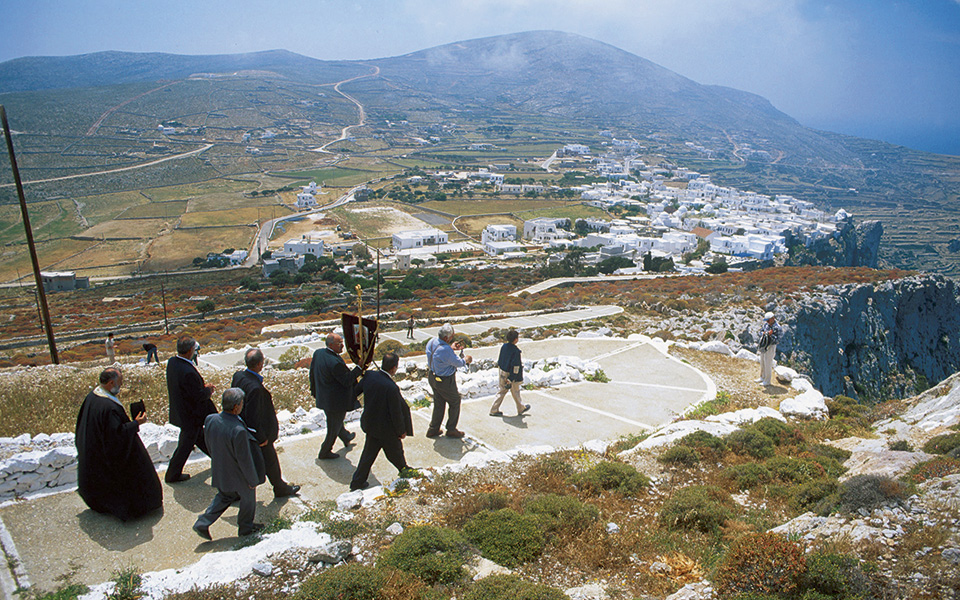
Folegandros: A large silver icon of the Blessed Virgin (usually adorned with reddish flowers) is carried down to the port of Karavostasi for a blessing ceremony of the boats.
© www.iml.gr
By April, one can safely say that the worst of winter has passed and spring is well and truly here. Sartorial caution is still advised however – that warm midday sunshine is a real trickster and it only takes the appearance of a little cloud cover and a mild breeze to make you painfully aware that your mother was right about that coat.
Easter most commonly falls in April. Next year, Easter Sunday is on April 16. While Easter comes relatively early this year it is still one of the best times to get out into the countryside and enjoy Greece’s most important holiday. Villages fill with returning families and anticipation gradually builds until the big blowout celebrations of Easter Sunday, when on mountain and seaside villages alike, the air fills with the scent of roasting lamb and the sounds of traditional music and merrymaking.
Regardless when Easter falls, the whole month of April is one of the best times to immerse yourself in nature in Greece. The islands of the Aegean are green and blanketed in a riot of wildflowers, while temperatures are perfect for activities like hiking and mountain biking. In the mountains, nature reawakens and the melting snows cause the rivers and waterfalls to swell to their fullest, providing some of the most adrenaline-inducing conditions for whitewater rafting and kayaking. For birdwatchers it is also a great time to visit some of the country’s wetlands that are busy with many migratory and endemic species doing their thing and making the most of the season.
Best For: Hiking, mountain-biking, skipping in fields of wildflowers, Greek Easter fun
Worst For: Mothers concerned whether everyone is dressed warmly enough
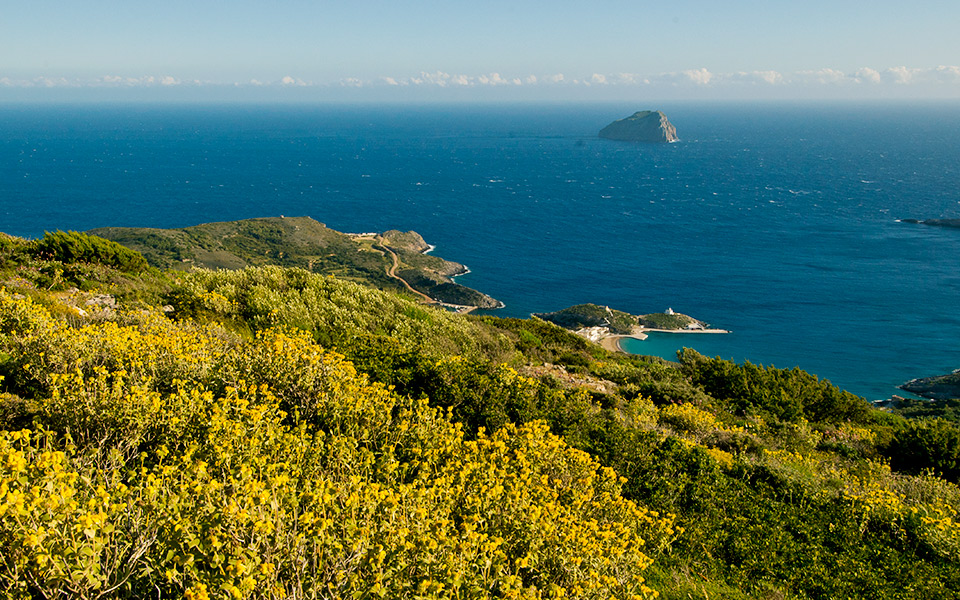
Spring on the island of Kythira
© Clairy Moustafellou
Temperatures steadily climb, rainy days grow ever more infrequent and in drier parts of the country the thick carpets of grasses and wildflowers already start to dry and go to seed. Summer is so close you can smell it.
On sunny days in hotter parts of the country like Crete and other more southern islands, trips to the beach start making an awful lot of sense, with more popular swimming spots already attracting dedicated sun-tanners eager to rid themselves of their winter pallor. Even in Athens May is arguably one of the best months to visit the beaches on the coast which will be uncrowded but glorious (albeit potentially still with a trace of coolness in the air). Your skin maybe a tad pasty but don’t worry – everyone’s is, like so many lumps of uncooked dough begging to be browned. The sea is still bracing to get into, but from May onwards it is possible to start swimming around without a wetsuit and all your limbs going numb.
Aside from the May 1st Labour Day holiday, May is a quiet month in terms of religious or national holidays – but who cares? Nature is in full swing, the days are getting warmer, the evenings longer and everything is right with the world. Like April, this is really one of the best months to travel anywhere in Greece and immerse yourself in nature with activities like hiking, mountain biking and the like, enjoying the lengthening days before the blazing heat of the summer really kicks in. Even Athens becomes pleasantly fragrant as the bitter orange trees that line the streets come into blossom.
On the islands many seasonal businesses will be applying the last licks of paint and receiving their first foreign patrons, looking forward to yet another wonderful Greek summer. And in cities and towns the nightlife migrates steadily outdoors as restaurant gardens, rooftop bars and the like are put to good use once again and open-air cinemas put out their folding chairs and start screening films under the stars.
Best For: Flowers, flowers everywhere!
Worst For: Allergy sufferers
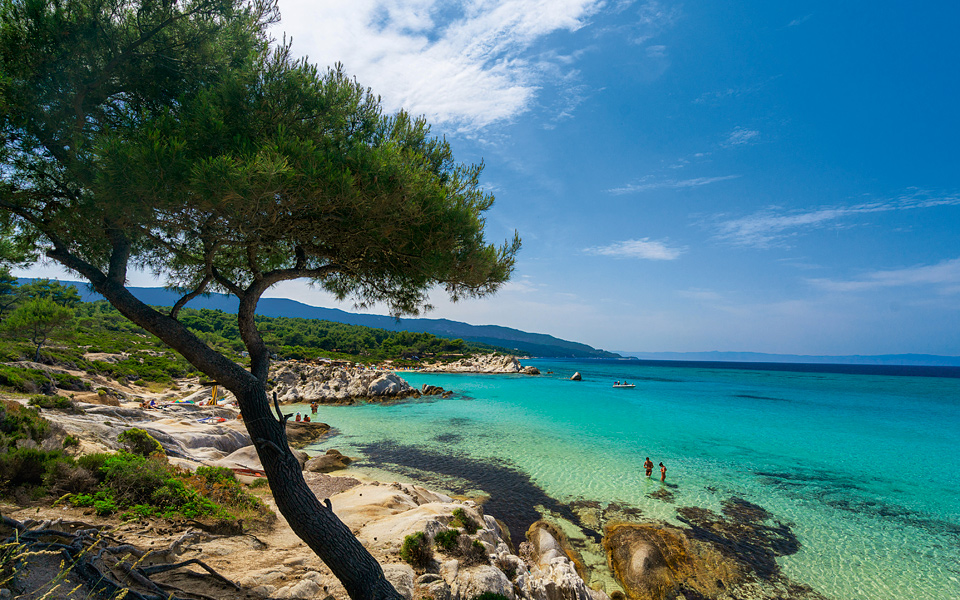
Enjoy empty beaches and warm temperatures in June (Sithonia pictured).
© Pericles Merakos
If May is more about the promise of things to come, then June is when Greece starts to deliver. Across the country people will be wishing each other ‘kalo kalokairi’ (happy summer) and the temperature – which will have perhaps grazed the 30s a few times in May, will now spend more and more time camped out there. Stop listening to your mother about that coat – unless you’re on the top of a mountain you won’t need anything heavier that a sweater or light jacket in the evenings.
The reliably hot weather brings the first serious waves of summer tourists, but these are relatively small compared to the major influxes of July and August. As such June can be a dream month to enjoy laid-back vacations even in highly popular destinations such as Mykonos and Santorini before the major crush arrives, taking up all the good sun-beds and accidentally poking each other with their selfie sticks.
Pentecost and the Monday of the Holy Spirit, falling on June 4-5 in 2023, is celebrated forty-nine days after Easter Sunday, and creates a long holiday perfect for a first trip to an island. But all June weekends, even for those living in cities, are like mini-holidays with great beaches just a short drive away (although these will increasingly begin to get crowded on the weekends as the temperature climbs.)
This is also the time that the summer festival program really gets under way in Athens, Thessaloniki and other major cities, with a wide range of open-air concerts and other events making the most of the long, warm evenings.
Best For: Early summer vacations before the crowds
Worst For: Staying indoors

Swimmers enjoy the crystal-clear waters of Kavourotripes (also known as Portokali) beach in Halkidiki.
© Athanasios Gioumpasis / Getty Images
In June, those 30-degree days make one remember what the Greek summer is all about. Then July comes along and makes that all seem rather quaint.
This is the month that sees some of the hottest temperatures of the year and it is rare that it passes without at least one major heat-wave with the mercury soaring into the 40+ region. While in May and June the heat is something welcome to be sought out – heading to the beach for example at high noon – in July it transforms into something to be negotiated and planned around (do not, for example, head to the Parthenon at 13.00 on a windless day unless you enjoy heat-stroke). On the hottest days in the city the heat is all-encompassing, present even in its absence – such as in the welcoming cool of an air-conditioned museum or cafe.
Fortunately this is also the month that the northerly Meltemi winds roll in bringing some welcome (relative) cool to Athens and the Aegean (and plenty of high-wind days for windsurfers and kitesurfers). And while the summer programs of concerts and festivals in Athens and Thessaloniki is in full swing, the real magic of the month, is of course escaping from the sweltering cities to the islands and countryside.
The summer tourism season is now fully underway and the ferries from Piraeus are filled with travelers heading to the islands for rest and relaxation. Schools are out, the bars and restaurants are full, and life is good (if occasionally hot and sticky).
Best for: Summer fun!
Worst for: Non air-conditioned indoor spaces

Navagio beach on Zakynthos
© Dimitris Vlaikos
Wandering the streets of Athens in August can be a surreal experience; even in the heart of the city the streets are almost empty, the car horns few and far between. The city’s bustle fades to a murmur.
If it seems like some two thirds of the city’s population have simply packed their bags and left, it’s because they have. August is the month in Greece where pretty much everyone not working in the tourism industry or the emergency services goes on holiday. The capital is more or less placed in mothballs with many family-run businesses shutting entirely for the month rather than keep the lights on in an empty shop.
This is truly peak summer.
The focal point of the month is, of course, August 15, an important holiday celebrating the assumption of the Virgin Mary. Across the country traditional festivals are held to mark the day with plenty of food, wine and traditional Greek dancing, and it is well worth seeking these out to enjoy one of the best experiences the summer has to offer.
Of course this means that August is also the busiest month of the year for everywhere in Greece outside of Athens, so if you plan to travel in this month, book early. It is also worth seeking out lesser-known destinations where the crowds will be less maddening.
Otherwise just enjoy the summer while it still lasts!
Best For: Summer fun!
Worst For: Trying to get literally anything done in Athens.
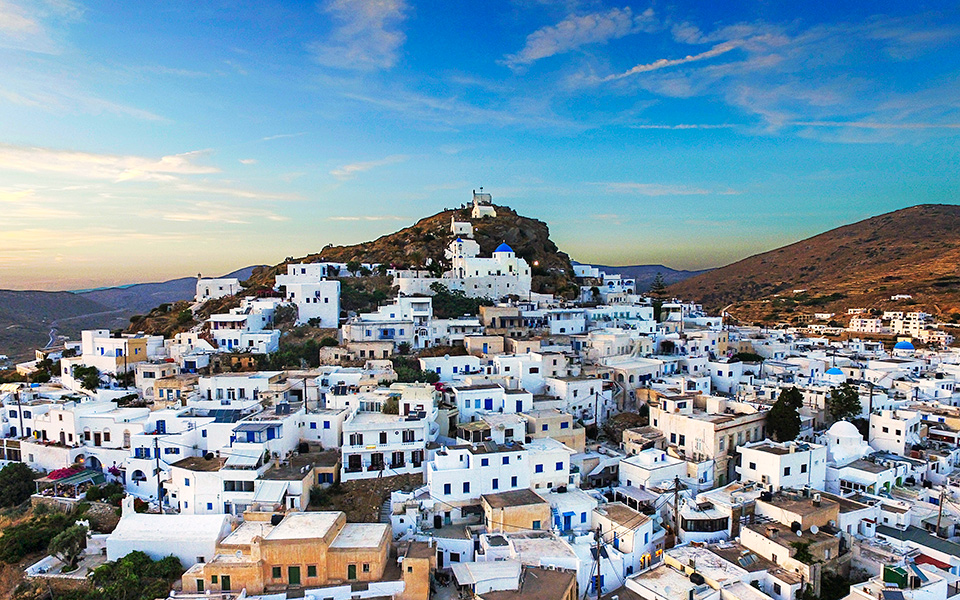
The island of ios
© Athanasios Gioumpasis / Getty Images
The bane of schoolchildren the world over, September is the month we put our flip flops and masks and snorkels away for another year and get back to reality, right?
Well, not necessarily. It is an increasingly well-known fact that the summer in Greece does not end with August. Sure the weather is beginning to cool a little bit, and the days are growing a little shorter, but that’s compared to the highs of August, meaning that there is still plenty of warmth and sunshine to enjoy right through September, and after the long summer the sea is at its warmest.
Add to that the smaller crowds, the lower prices and overall low-key vibe and it is easy to see why there is a growing number of people who profess September to be the best time for Greek holidays.
A number of islands and mainland destinations are seeking to capitalize on this season-extending trend by hosting festivals and sporting events. So if the crowds and high prices of August put you off, consider making September the month you head off for your Greek holiday (or better yet, have one in June and another in September!)
Best For: Last minute Greek vacations without the crowds.
Worst For: Back to school kiddies!
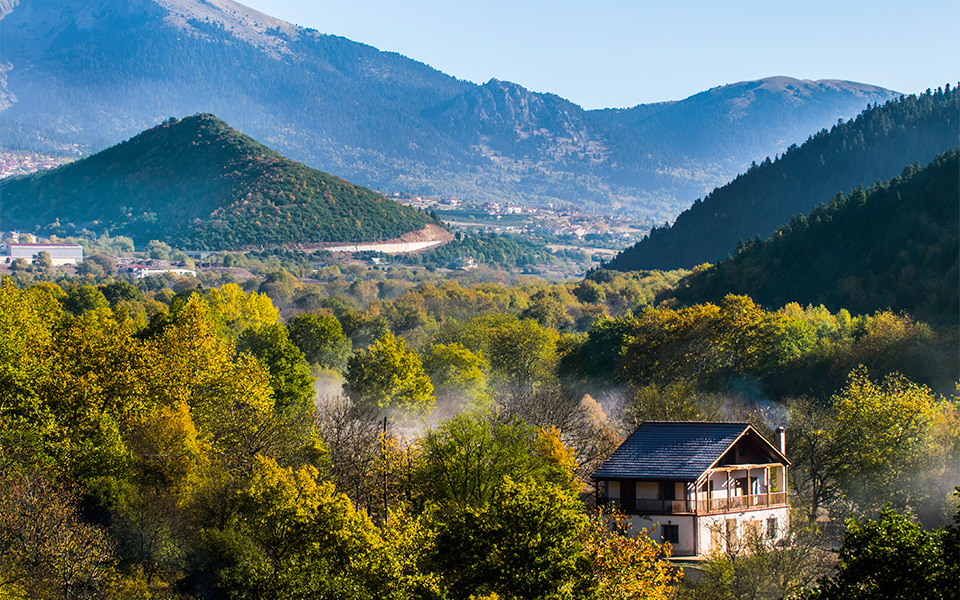
Karpenisi
© Clairy Moustafellou
For the true die-hard summer fans the first week or two of October can also hold some summery days, although by now the weather is far less reliable and it is clear from the nip in the air and the first of the autumn rains that the summer is well and truly over.
But after almost six months of warm-to-scorching weather, this can come as a relief. Now is the time to start to appreciate the transition to the joys of the colder months. Hearty, meaty stews and pies begin to replace summery salads and seafood, and mountain hikes – unthinkable in the summer heat – begin to appeal once again.
The month comes to a close with the national holiday of Ohi Day (October 28) which commemorates the Greek government’s refusal of an ultimatum issued by Benito Mussolini in 1940, marking the start of Greece’s participation in WWII. The day is celebrated with student and military parades.
Best For: Brushing off the hiking boots, rediscovering the word ‘chilly’
Worst For: Those who wish the summer would never end.
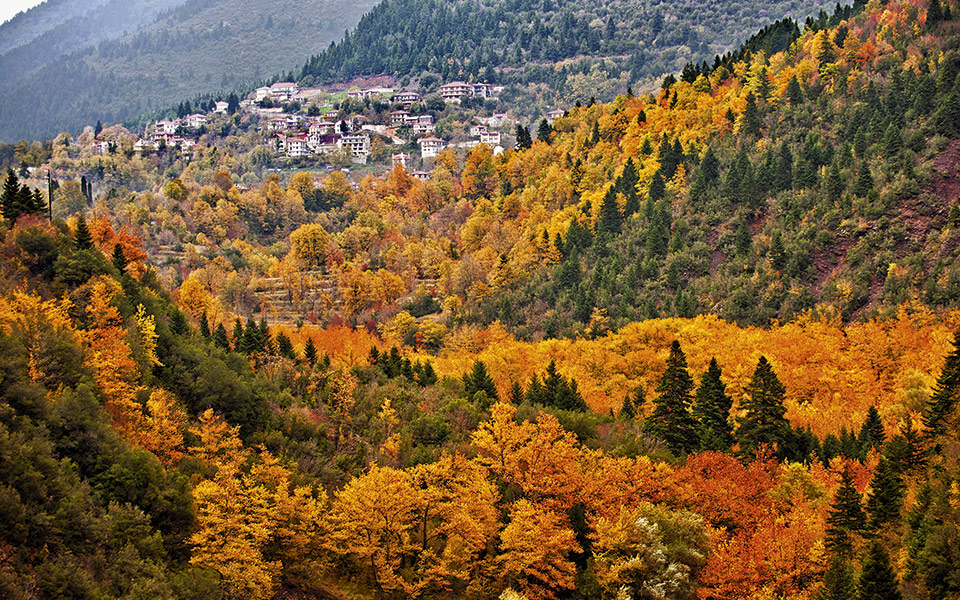
Autumn colors in Megalo Chorio in Evritania
© Olga Charami
And finally we end with the autumnal transition into the winter (which usually only begins to really bite from mid-December onwards).
In much of Greece autumn is a relatively low key affair, marked only by a gradual return of green to dry, brown hills. To get the most out of these months, the best option is to head to the forests and mountains of the north and west of the country. Here mixed and deciduous forests take on the multi-colored hues characteristic of the season. The taller peaks will also get their first snowfalls and towards the end of the year ski resorts will open again. Fellow travelers are few and far between meaning any country jaunts will be relaxed affairs, perfect for getting away from it all.
This is also a great time to take to the waters of the country’s many spas and hot springs (many older Greeks swear that taking to the waters now keeps arthritic pains at bay for the entire winter).
Alternatively do what most Greeks do and focus on the delights that Athens and Thessaloniki have to offer. In any case, before you know it the Christmas holidays will be on us again, followed by a new year brimming with possibility.
Best For: Apples, oranges and Christmas.
Worst For: That summer profile picture on Facebook is beginning to look a little dated.
From a mysterious Minoan structure to...
In Leonidio, Easter comes alive with...
There’s something about Samos in summer...
In the castle town of Monemvasia,...